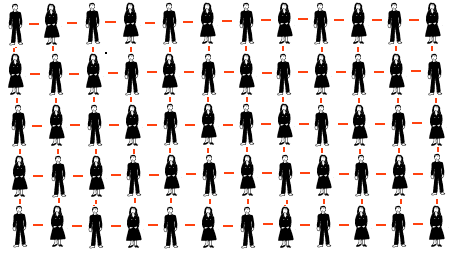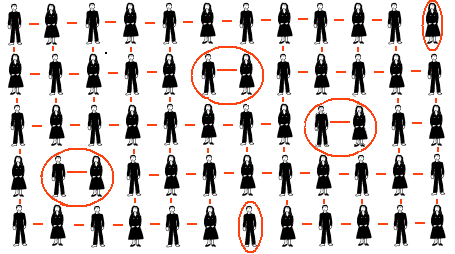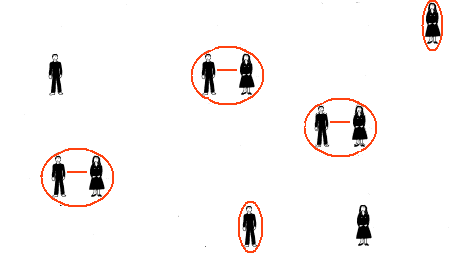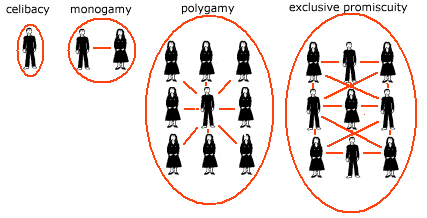
One Explanation of Monogamy
The defensive society
Why do men and women live in monogamous marriages in some societies, and polygamously in others?
It might be argued that it would be better for people to live in polygamous groups rather than monogamous marriages. In a sexually polygamous society, where nobody knows who is the father of any child, mothers would receive the support of several possible fathers, and be able to share child care with several other mothers. Sharing the burdens of raising children among a social group, rather than loading it all onto a single couple, would appear to offer many advantages. In many ways, human society exists entirely for this purpose.
Furthermore, it makes economic sense for people to live closely together. It takes less energy to heat one large house filled with 20 or 30 people than it does to heat 15 or 20 separate small houses with two occupants in each. It equally requires less energy to cook food in one large pot than in 15 or 20 separate pots.
Equally, it makes social sense for people to live in close proximity, so that no one is ever lonely, and nobody falls sick or gets hurt without others helping and assisting.
And quite apart from the economic merits of close conviviality, it would anyway seem that humans are naturally promiscuous. If humans were naturally monogamous, then sexual promiscuity would be entirely unheard of, and no clerics would have ever thundered against the iniquities of adultery and fornication. Indeed, if humans were naturally uninterested in sex, those same clerics would have been thundering against the iniquity of celibacy, and encouraging promiscuity. For if there are perils in too much sex, there are also perils in too little: if no sexual reproduction takes place, human society dwindles away into extinction.

However, perhaps the principal problem with such sexual and social arrangements is that they allow the rapid propagation of communicable diseases. The closer people live together, and the closer they come into physical contact, the more likely it is that they will communicate disease to each other - sexual relations providing the most intimate contact. As soon as one person in such a promiscuous society contracts such a disease, it will take on epidemic proportions. The more intimately people live together, and the greater the number of their intimate liaisons, the greater the possibility of an entire society contracting some disease. And if these diseases are often fatal, the effect of a general promiscuous close association is likely to be the decimation of human society.
Much the same goes for any other misfortune. If all live together under one roof, then all are likely to die if the house catches fire, or collapses in an earthquake. To the extent that people are closely united, to the same extent they are likely to meet with the same fate.
However, no society will exhibit continual promiscuous contact. At any one time, some individuals may be absent, or effectively celibate. And equally, where two people are temporarily an exclusive couple, they are effectively temporarily monogamous.

In a society in which some people are sexually promiscuous, and others are monogamous, and others celibate, the effects of sexually transmitted disease will entirely fall upon the sexually promiscuous portion of the population. If the diseases are regularly fatal, the effect of an epidemic will be to decimate society, and leave only monogamous couples or celibate individuals, and perhaps a few people with a natural immunity.

These pockets of exclusivity may be composed of single celibate individuals, monogamous couples, polygamous families, or even groups of men and women who practise promiscuous sex exclusively within the confines of the group.

However, the larger the sexually exclusive group, the greater the danger that it be compromised by sexual relations outside the group. Therefore celibate individuals are the least likely to acquire sexually transmitted diseases, and monogamous couples are the second least likely to acquire such diseases, and so on. And since monogamous couples are able to produce children, whereas celibate individuals do not, monogamous couples offer the strongest enduring defence against sexually transmitted disease.

The most important requirement is sexual exclusivity. Monogamous couples must not become contaminated by extramarital liaisons. Such exclusivity also demands that both men and women are virgins before marriage. Such exclusivity also precludes divorce and remarriage, since a society made up of divorcing and remarrying individuals is no better than a promiscuous society at preventing the spread of sexually transmitted disease. The only ground for divorce is the threat that the infidelity of a spouse threatens the health of their partner. And what constitutes adultery or infidelity may well extend to include any bodily touch or unsupervised meeting.
Indeed, the exclusivity of monogamy may also extend to children, such that not even children are allowed any contact with others, and are kept at home until they are ready to enter their own monogamous unions. In this extreme, monogamous marriages would almost become isolated societies in themselves, minimizing every sort of contact with others.
In such societies, the rank order of individuals is one in which celibate individuals have the highest status, followed by monogamous couples, with promiscuous individuals given a low ranking, and prostitutes given the lowest rank of all. For this is the rank order of personal sexual purity, and of general purity. The very highest rank of purity is that of the hermit who lives completely separately from society, and never shares in any of its misfortunes.
Thus the effect of disease upon society is to leave it not only decimated, but also atomised. In some cases, a human society may understand that certain kinds of compartmentalisation provide a defence against disease. But if not, then if the survivors of plagues continue with their customary way of life, in every detail, then they are quite likely to survive future outbreaks of disease, even if they do not know why they survived previous ones. In the absence of understanding, the rigorous observance of custom must often prove an effective deterrent against misfortune, simply because some customary habits provide a quite accidental protection.
With monogamy, there came the physical separation of monogamous couples into households, and the dispersal of these households, the effect of which was to minimize all contact with others. The effect of this would have been compartmentalise society physically as well as sexually. The transmission of all kinds of communicable diseases is reduced by this separation.
Dispersal and reunion
The general argument of this essay is that communicable disease acts to disperse unified, convivial, and sexually promiscuous societies into compartmentalised and atomised societies. Since sexual relations bring people into the closest possible contact, such relations are one of the principal routes through which such disease is communicated. Monogamy and celibacy compartmentalise society and limit the damage that these diseases inflict. In tandem with monogamy and celibacy, society becomes physically dispersed in separate households. Furthermore, in their dealings with one another, compartmentalised societies adopt formalised customs that minimise contact, discouraging unnecessary social activities, cultivating reserve and distance.
If the punishment for breaking the strict laws compartmentalising society was sometimes death, it was because breaking those laws brought death to society. An adulterer was somebody who had become adulterated, impure, and whose actions may have introduced some nameless disease into a community, and cost many lives.
The compartmentalisation of society also offered defence against other misfortunes than disease. The impact of fire, flood, storm, and earthquake on a dispersed society would generally be much less than the effect on a united and centralised society.
Yet the very success of compartmentalised, monogamous society in restricting communicable disease led inevitably to its decline. After a while, people who seldom suffered from such diseases would have begun to forget the purpose of monogamy. With the long passage of time, the rationale behind these defensive measures was gradually lost, and the observance of the law became merely habitual, a matter of doing the done thing. And once the reasons underlying any code of conduct are lost, or replaced with superstitious rationalisations, the codes themselves first become empty dogmas, and then lapse into disuse.
However, to the extent that the threat of disease and fire and similar disasters actually recedes, then to that extent the real need for dispersal and compartmentalisation declines, and human societies are likely to become reunited in a renewed coviviality. For dispersed defensive societies are less idle than united societies, as it is simpler and easier to live in close proximity under one roof together. Therefore as the threat of disease recedes, the result is likely to be the gradual reunion of society, and the resumption of a general promiscuity.
At which point the rank order within society becomes inverted. Celibate hermits drop to the bottom rank, with monogamous couples the next up, and with courtesans at the top.
Seen from this perspective, monogamy, celibacy, and the nuclear family are the natural organisation of a society facing the threat of decimating disease. Such compartmentalisation of society is essentially defensive. Once the threat passes, or other means are found to combat it, monogamy and celibacy cease to be virtues, much as a city's walls fall redundant once an enemy has been finally repulsed.
If, along trade routes which regularly brought not only the produce of distant lands but also a host of communicable diseases, societies adopted monogamy and celibacy and ritual purification, it was as a defence measure against such diseases. And equally, if, on some remote Pacific islands which no outsider visited from one century to the next, societies reverted to a genially promiscuous life together under one roof, eating and drinking from the same dishes and cups, all monogamy and celibacy and purity long abandoned, it was because they faced no threat from disease. Or at least not until European ships brought both the problem and its answer - the first in their pox-ridden crews, and the second in their Christian chaplains.
